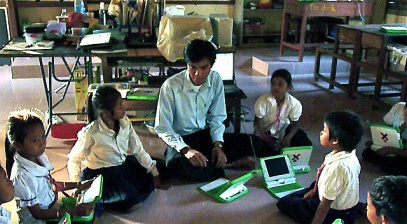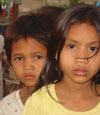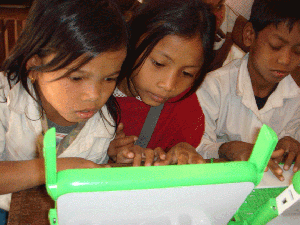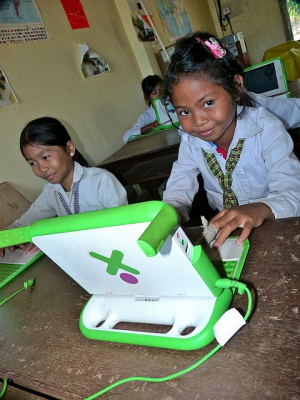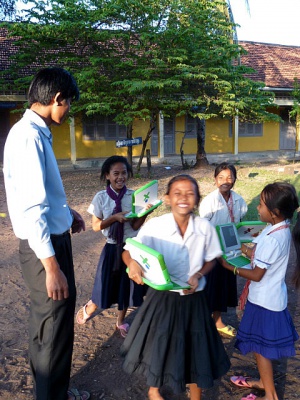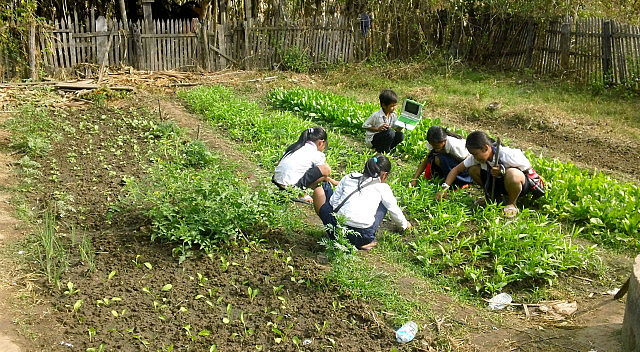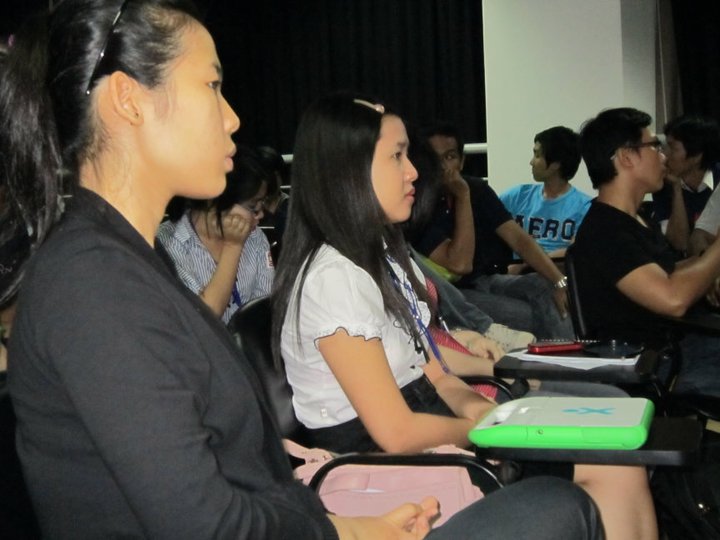OLPC Cambodia
| Country Information | |
| ISO Country Code | KH |
| Wikipedia Article | Wikipedia Link |
| Government Support | Low and not OLPC Priority |
| Deployment | Demonstration (under 50 machines) |
| Languages | |
| Keyboard Layout | OLPC Khmer Keyboard |
| Written | Khmer (kh) |
| Spoken | Khmer (kh) |
| Secondary Written | English (en) |
| Secondary Spoken | English (en) |
Bienvenue-Welcome
... and thank you for visiting the Cambodia "OLPC" related Wiki-Pages, for the One Laptop Per Child Universal Primary Education project. This is an Open Community project, similar to the Wikipedia and Open Source Community projects, like Linux, OpenOffice, etc. and it is working along Agenda 21 and Millennium Development Goal nr.2: Bringing Universal Primary Education. To edit text on this page or add pages, log in and and "edit page / save page" button will appear.
- 2' video - OLPC Intro part 1
- 2' video - OLPC Intro part 2
- 7' video: Impact on teachers, parents, kids, society.
The aim of this educational project is to bring Universal Primary Education by 2015 as per - anno year 2000 initiated - United Nations Millennium Development Goal nr.2. For this and above approach, - and also a lot of lobbying by the right persons on the right places and time - the United Nations is a Partner in this Open Community project! It is the largest educational project undertaken by Humanity ever... and deemed by many as one of the most inspiring projects out there ... and things are moving very fast indeed: over 86.000 eBooks available, all education disciplines covered, 2008 saw the first 3 developing countries with full coverage, i.e. with all kids age 5 to 12 equipped with these smallest schools in a box-laptops.
In many respects, OLPC was born in Cambodia. Nicholas and Elaine Negroponte started a school - The Elaine and Nicholas Negroponte School - in 2000 as part of an effort by Bernie Krisher to reach out to children in rural Cambodia. They brought laptop computers to the school as part of their efforts to bring opportunities for learning. The program was so successful that Nicholas was inspired to try to do the same for every child. More: http://tedxmiami.com/bio/rodrigo-arboleda-2/ skip to 9:14 by Rodrigo Arboleda is currently Chairman and CEO, for One Laptop per Child Association (OLPC).
In February 2008, 520 donated XO laptops from the Give One Get One program arrived in Cambodia. This shipment was distributed to a wide-range of government schools and educational NGOs. 390 machines were donated to primary schools in remote rural villages where there is no electricity and very little educational opportunities for the local children. The remaining 130 machines went to both urban and rural schools, orphanages and educational centers for children.
List of the OLPC XO-XS schools in Cambodia
- haven't been able to find out where these schools are, so please list them if you know with an url from google maps --SvenAERTS 15:04, 2 August 2013 (UTC)
- The XO machines are used in Computer Class at Tchey School, in Tchey Village outside of Siem Reap, Cambodia. The school is powered by solar energy.
- The Elaine and Nicholas Negroponte School I found a video report on one of the schools, i.e. the The Elaine and Nicholas Negroponte School where they started with non-XO laptops before they even existed and later the school also received XO's.
Educators in Cambodia see the potential for the XO laptops to assist in creating stimulating learning environments for rural children. This may be the catalyst for rural communities to begin to build a positive approach to learning, something that has been neglected throughout decades of civil war, isolation and poverty.
Thank you to all those in North America who participated in the Give1 Get 1 initiative, and thank you to OLPC!
A Cambodian language localization of the XO software has been started.
Feedback from The Elaine and Nicholas Negroponte School
We have 117 students enrolled at the primary school and 183 at the secondary school for a total of 300 students. Five students who graduated from our programs are now enrolled at private colleges in Phnom Penh. As more graduate from high school (where we don’t run a program), we expect to see greater numbers of students continuing on to college, enabling them to get good jobs. We’ll keep you informed as our graduates continue to succeed.
We have recently, installed Khan Academy courses in math and science at both the primary and secondary schools.
Unfortunately, while we are making significant progress, we are still faced with ongoing corruption at all levels of education. Starting in the primary schools, there is a longstanding practice of paying off teachers for books and grades. This continues throughout a student’s entire school career, resulting in many of the poorest students being unable to pass their baccalaureate to graduate from high school. This is the real crime of Cambodian education.
TEACHER’S REPORT
Our teachers continue to work very hard and long hours at the schools. It should also be noted that often their day does not end with their last class, but continues outside the classroom after the school day has ended. Virak S, the primary school English teacher, reports that there continues to be a problem with children dropping out. In October, we began the school year 119 students. By the end of March two dropped out from our program. Teacher Virak notes we always try to find out the, ”Why’s.”
Our priority is to encourage these children to stay in school, and to help provide them with the stability and incentives they often do not receive at home. Younger children–especially those in the second or third grades–are just too young and inexperienced to make decisions about whether or not they should stay in school. Virak notes that extra patience with children with poor attendance is very important.
One child, Sok Chab, is a good example. When his mother first enrolled him in the second grade, he had both terrible attendance and poor attention in class. But after the first year, things turned around for him. In fact, he had such a turnaround that he even beat the fourth and some of the fifth graders in a phonics contest. We have seen this pattern repeatedly and know that many of these children have wonderful potential if given the attention and nurturing needed to get them off to a good start.
We continue to reach out to all students in our commune to find the most needy. Since our teachers live in the communities they know who needs encouragement and help with such things as clothing, family encouragement and any other reasons that might be keeping a child from school.
Thank you Schlumberger Philanthropic Organization SEED
We were very fortunate to have another experimental program sponsored by SEED (Schlumberger’s philanthropic program) at the Chung Family Junior High School. In January, an enthusiastic employee of Schlumberger’s Alaskan branch, Nate LaCroix arrived at the school to help the junior high school students run experiments. Thanks to Schlumberger the students learned how to conduct electricity using copper and a lemon! Another very important experiment was learning about buoyancy. These government students had never conducted scientific experiments before and these tests, we believe will inspire them to learn more about the world around them.
Going Green and Learning Nutrition at Reaksmy Primary School
The school’s organic garden helps to feed our students. The garden is totally the work of the students and is run by the 6th graders. First, they must get the “horrid” soil ready, plant seeds, and weed and water at least twice a day. Once the vegetables are ready they harvest and sell them in their community. At the end of the school year the children will use the money they have made to give themselves a party which Elaine always helps with.
The notes from a recent teacher meeting reported: “Teacher Channa has requested that the 6th Grade students who run the garden at the Primary School need more seeds. He will send a list and I will try to pick up any seeds that cannot be bought in Rovieng. The garden looks beautiful and even the sweet corn has managed so far. Vanney and Elaine have made an organic pesticide which seems to be working, so far. Teacher Channa was given a SiPhar book on growing mushrooms to learn if this is also something our gardeners should try.”
The students are learning valuable real world skills from this important school activity. They learn about the importance of a varied diet, food hygiene, and when they sell the produce they have grown, they practice their sales, math and bargaining skills too.
Who is who in Cambodia
- Who is who in Cambodia
- 28 Feb.-2 Mar 2014 hosted http://fossasia.org/venue in Phnom Penh, Cambodia - THE 2014 Open Source Technology Event in Asia and look who we spotted:
| Primary Language | ,|x|Language spoken::x}} |
| Number of Laptops | Number of manufactured laptops::1000 |
| Keyboard Layout | Keyboard::OLPC Khmer Keyboard |
| Build | ,|x|Software release::x}} |
| Date(s) Arrived in Country | ,|x|Has received laptops on date::x}} |
| School Server | ,|x|School server status::x}} |
| Deployment Status | Deployment status::Exact deployment date not set yet. 1000 of 3200 laptops have already been deployed to schools, however. |
